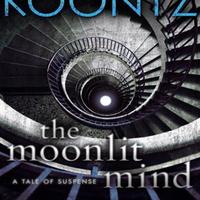The Moonlit Mind by Dean Koontz Ch 1
Crispin lives wild in the city, a feral boy of twelve, and he has no friend but Harley, though Harley never speaks.
Friendship does not depend on conversation. Sometimes the most important communication is not mouth to ear, but heart to heart.
Harley can't speak because he is a dog. He understands many words, but he isn't able to form them. He can bark, but he does not. Neither does he growl.
Silence is to Harley as music to a harp, flowing from him in glissando passages and arpeggios that are melodious to Crispin. The boy has heard too much in his few years. Quiet is a symphony to him, and the profound silence in any hushed place is a hymn.
This metropolis, like all others, is an empire of noise. The city rattles, bangs, and thumps. It buzzes and squeals, hisses and roars. Honks, clangs, tolls, jingles, clicks, clacks, creaks, knocks, pops, and rumbles.
Even in this storm of sound, however, quiet havens exist. Across the vast lawns of St. Mary Salome Cemetery, between tall pines and cedars like processions of robed monks, concentric circles of granite headstones lead inward to open-air mausoleum walls where the ashes of the dead are interred behind bronze plaques. The eight-foot-high, freestanding walls are arranged like spokes in a wheel. On any windless night, the massive evergreens of St. Mary Salome muffle the municipal voice, and the wheel of walls baffles it entirely.
At the hub where the spokes meet lies a wide circle of grass and at its center a great round slab of gray granite that serves as a bench. Here, Crispin sometimes sits in moonlight until the silence soothes his soul.
Then he and Harley move to the grass, where the boy prepares his bedroll. With no guilt to claw at his conscience, the dog sleeps the sleep of an innocent. The boy is not so fortunate.
Crispin suffers nightmares. They are based on memories.
Harley seems to dream of running free, toes spreading and paws trembling as he races across imagined meadows. He does not whimper but makes small thin sounds of delight.
Once, when the boy was ten, he woke well past midnight and saw the silvery shimmering form of a woman in a long dress or robe. She approached between two mausoleum walls, seeming not to walk but rather to glide like a skater on ice.
Crispin sat up, frightened because the woman had no substance. Moonlit objects behind her were visible through her.
She neither smiled nor threatened. Her expression was solemn.
She drifted to a stop about two yards from them, her bare feet a few inches above the grass. For a long moment, she gazed upon them.
Crispin felt that he should speak to her. But he could not.
Although the boy only half rose, Harley stood on all fours. Clearly, the dog saw the woman, too. His tail wagged.
When she moved past them, Crispin caught the scent of perfumed ointment. Harley sniffed with what seemed to be pleasure.
The woman evaporated as if she were a fog phantom encountering a warm current of air.
Crispin first thought she must be a ghost haunting these fields of graves. Later he wondered if he'd witnessed instead a visitation, the spirit of Saint Mary Salome, for whom the cemetery was named.
Over the past three years, since he was nine, the boy has lived in this city by his wits and by his daring. He has enjoyed little human companionship or charity.
He doesn't spend every night in the cemetery. He sleeps in many places to avoid following a routine that might leave him vulnerable to discovery.
In places more ordinary than cemeteries, he and the dog often see extraordinary things. Not all their discoveries are supernatural. Most are as real as sunlight and starlight, and some of those things are more terrible than any ghost or goblin could be.
This city—perhaps any city—is a place of secrets and enigmas. Roaming alone with your dog in realms that others seldom visit, you will glimpse disturbing phenomena and strange presences that suggest the world has dimensions that reason alone cannot explain.
The boy is sometimes afraid, but never the dog.
Neither of them is ever lonely. They are family to each other, but more than family. They are each other's salvation, each a lamp by which the other finds his way.
Harley was abandoned to the streets. No one but the boy loves this mixed-breed canine, which appears to be half golden retriever and half mystery mutt.
Crispin was not abandoned. He escaped.
And he is hunted.

